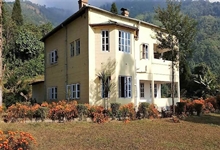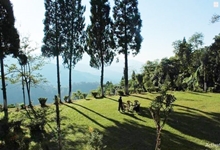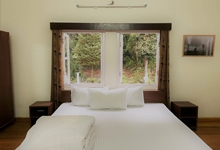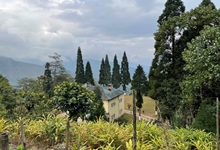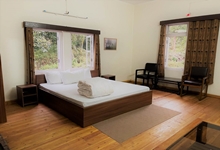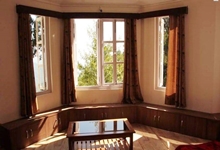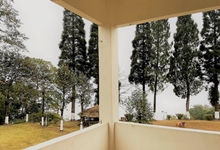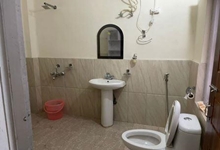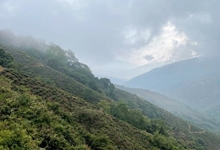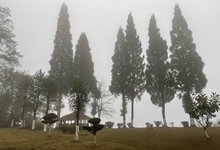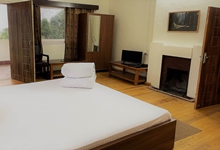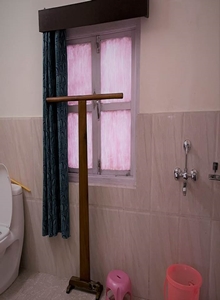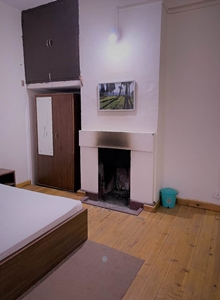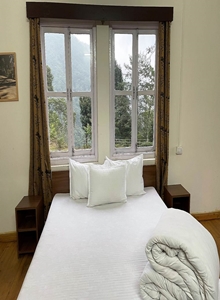POOBONG TEA ESTATE
Poobong Tea Garden (also spelled Pubong) is a village in the Jorebunglow Sukhiapokhri CD block in the Darjeeling Sadar subdivision of the Darjeeling district in West Bengal, India. The word Poobong literally translates to ‘A Valley behind the Clouds’ is enigmatically named as this area is shielded in the midst of clouds floating that adds more beauty to the lush green tea garden of Poobong and provides a sense of ecstasy to the tourists. Poobong Tea Estate was established way back in 1913 and it lies on the southern part Darjeeling Himalayan hill region in the Darjeeling district. Poobong, situated between Sukhiapokhri and Ghoom, and the place is so small that it is often referred to as ‘Chota Poobong‘. Poobong Tea Estate is nestled at an altitude of about 1520 meter (4990 feet) and it produces one of the finest qualities of Darjeeling tea. Poobong has two divisions; one is Tea Estate and the other local Village or busty (Fatak). The local inhabitants of Poobong Village are mainly involved in working in the Tea Garden which is a major source of income, but apart from that agriculture is also another source of livelihood among the villagers of Poobong Tea Estate. Poobong Tea Estate is one of the tea estates of Darjeeling which was established by the British. The picturesque Poobong Tea Garden offers a serene, beautiful and breath-taking view of nature along with the thick natural vegetation and lofty Himalayan ranges. Poobong Tea Garden is certified as ‘Organic Tea Producer’ and ‘Rain Forest Alliance’ under I.M.O control and all the teas produced at Poobong is totally free from synthetic chemicals. Poobong Tea Garden is an example of the scenic beauty of the surrounding landscapes which is dominated by dense pine forests, meandering rivers, sprawling lawns of the tea gardens and the view of the mighty Himalayas and is enough to make the visit worthwhile. The nearby forest of Poobong is abounding in wildlife and distinct flora. One can spot wide species mammals and reptiles like the Bear, Boar, Pangolin, Peacock, Dear, Leopard, Wild Fowl and others are to name but a few along with wide species of Himalayan birds. The flora consists of a huge variety of Himalayan plants like Oak, Pine and many other Herbal plants such as Dandelion, Artemisia, Thysanoleana Ltifolia, Urtica Dioica, etc.
Things to around Poobong Tea Estate:
Poobong Tea Estate offers numbers of activities for tourists to explore the region.
- Poobong Tea Estate is an ideal destination for tourists looking for solitude and comfortable stay in the midst of a tea estate.
- Tourists staying at Poobong Tea Estate can opt for a morning trail in the tea estate or one can also trek to the nearby waterfalls. Tourists opt to explore beyond the estate, can take a drive to Sukhiapokhri, Manebhanjan or even Darjeeling Chowkbazar.
- A walk through the lush green tea bushes and experiencing the processing of tea is a unique educational tour for the tourists at Poobong as the Tea Factory is located near to the tea garden of Poobong where tourists can watch the orthodox way of tea processing. The freshly plucked tea leaves are carried to the factory in bags and the dry tea leaves are trickled down in troughs which are wooden planks. Then the procedure of tea making follows step by step which starts with withering, rolling, fermenting or oxidation, drying or firing, sorting (leaves, broken, fanning, dust), grading and finally packing of black tea and green tea. After that tourists can have an experience of tea tasting session savoring the delightful Poobong Tea.
- Tourists can sit ideally in the lawn, and keep listening to the chirping sounds of birds and crickets with a panoramic view of the tea garden on the slopes of the surrounding foggy hills.
- One can try out camping at Balason river located nearby Poobong Tea Estate.
- Tourists who love to hike can take a short trek to the nearest forest area and breathe in the fresh air of the pine forests and enjoy the tranquil atmosphere.
- Depending on the time of the year, tourists can experience the seasonal beauty of sub-Himalayan region at its best.
- As soon as the hills are over casted with clouds, tourists will be fortunate enough to feel a flurry of mist and a beautiful scenic ambience all around.
- Tourists can opt for a drive by the charming and attractive winding road through pine trees and giant ferns on a cloudy or foggy day through a drape of mist all the way
Quality of tea produced in Poobong Tea Estate:
The quality of tea produced at Poobong Tea Estate has three major flushes. The first flush takes place mid-March to mid- May that is the early spring flush, the second flush is from late May to mid-July which is the mid-summer flush, the third flush is monsoon flush that is during the rainy season mid-July to September and the last flush (also known as autumn flush) occurs from mid-September to November. The tea flushes of Poobong produced here are some of the finest quality of Darjeeling teas and the tea flushes of Poobong are mostly of pure chinary cultivar.
How to reach:
By Air: The nearest airport to Poobong Tea Estate is Bagdogra Airport located around 03 hours driving distance. From Bagdogra Airport tourists will get hired cars on Sukhiapokhri – Ghoom Road to reach Poobong Tea Estate.
By Rail: The nearest rail head to Poobong Tea Estate is New Jalpaiguri located around 75 km away by road. Tourists will easily get vehicles on hire from NJP railway station upto Poobong Tea Estate.
By Road: Poobong Tea Estate is well connected by road networks with the nearby tourist destinations and railway stations. Poobong Tea Estate is located at a distance of 08 km from Ghoom railway station and 13 km from Darjeeling. The main village is located 3.5 km inside from the main road. Poobong is located around 60 km away from Kalimpong (2.5 hours by car).
Best time to visit:
Poobong can be visited throughout the year. In the winter tourists can experience the snowfall which transforms Poobong into a magical land covered with snow. Summers are best to escape the scorching heat of the plains. And during monsoon season the whole region blooms with dense greenery and a visit though the rainy season has its own unique charm too.
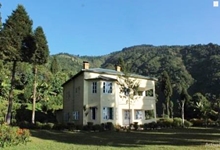
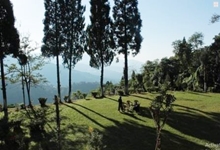
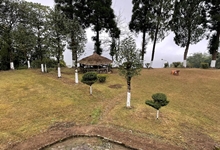
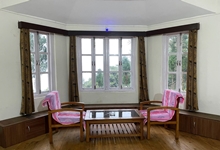
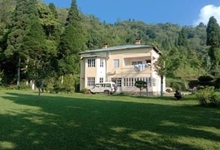
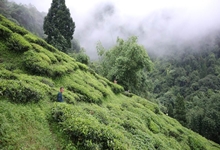
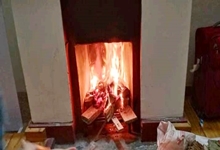
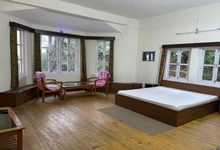
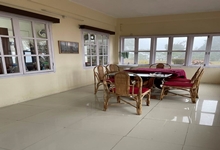
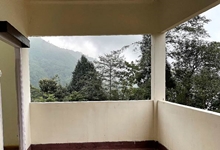
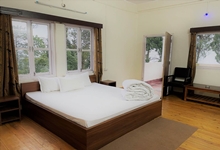
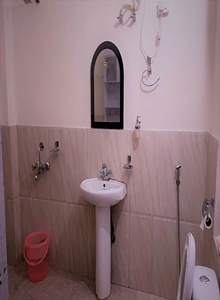
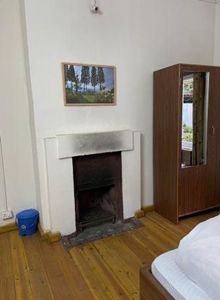
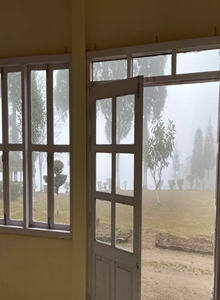
POOBONG TEA BUNGALOW
Poobong Heritage Bungalow or Poobong Tea Bungalow was built in 1935 by the Duncan’s. Poobong Tea Bungalow offers great hospitality and a splendid view of the tea gardens and the mighty Himalayas. Poobong Tea Bungalow is a two-storied plantation house having very large spacious rooms which are structured way back in the colonial times. Poobong Tea Bungalow has 03 rooms on the first floor and 01 room in the ground floor. The chesterfield rooms of Poobong Tea Bungalow creates an ambience of rejuvenation and relaxation for the tourists. Each room of Poobong Tea Bungalow has at least 2 large windows which open to the serene Pine forests or the hills that give you an imposing space around you and let you forget the hustle and bustle of city crowd. Each room of Poobong Tea Bungalow is equipped with modern facilitates and opens up to the sprawling lawn. Tourists opt to stay at Poobong Tea Bungalow can feel the aura of Colonial British rule in India.
Amenities available:
Rooms are comfortable and cozy.
Free parking area.
Bonfire with delicious roasted non-veg items (chargeable).
Car facilities -The resort provides pick and drop service.
Housekeeping service.
Seating area in the lawn.
24 hours Room service.
Fireplace in each room.
Private balcony.
Clean bathrooms with modern facilities.
Local tours from the resort on request.
Room Tariff:
01st Floor:
King’s Room: 9000/-
Queen’s Room: 8000/-
Princess’ Room: 7000/-
Ground floor:
Royal Guest: 6000/-
Planter’s Room: 8000/-
Breakfast Indian or English, complementary with room tariffs.
HOW TO BOOK: Call us at 9831311606 , 9830381306, to get the current availability status or use the query form furnished below with all you travel queries and submit, we will call/ contact you directly.
Or, you may also directly book from our Kolkata office at: 8C Shanti Ghosh Street, Kolkata – 700003. Nearest Landmark: Manindra Chandra College and Shyambazar Metro Railway Station (Gate No: 3).
